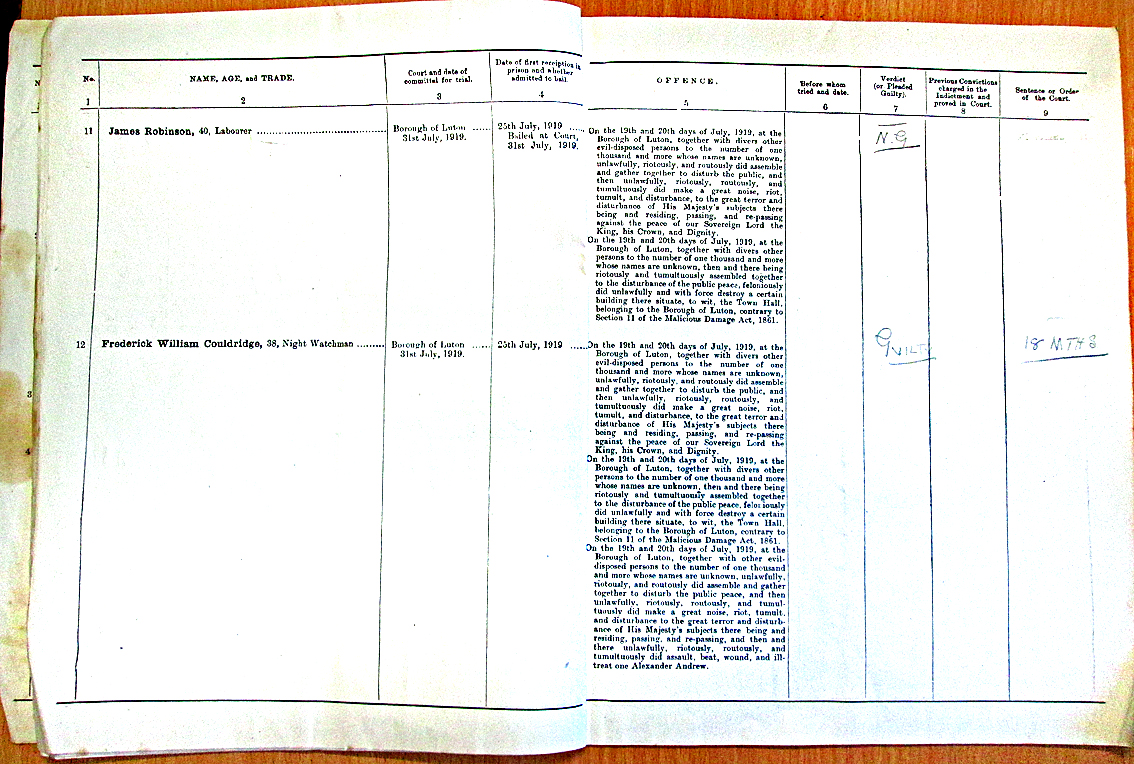
- Assizes record courtesy of Mr John Gillespie, grandson of Insp Fred Janes.
James Robinson, aged 45, labourer, of 3 New Street, Luton, was charged with: “On the 19th July 1919 together with divers other persons to the number of one thousand or more unlawfully and riotously assemble to disturb the public peace, and then did make a great riot and disturbance to the terror and alarm of His Majesty’s subjects there being and against the peace of our Sovereign Lord the King, his Crown and Dignity”.
MAGISTRATES COURT
Giving evidence to Luton magistrates again on July 31st, Police Sgt Henry Parsons said Robinson made a speech at the Town Hall in the afternoon, and said: “Do you want to see the Mayor?” The crowd replied: “Yes”.
Prisoners then said: “Give him five minutes to come out, and if he does not come out then I will help you fetch him out.” The crowd again shouted: “Yes.”
Witness further stated that he met prisoner coming down the main stairs at the Town Hall when he arrived there from Wardown in the afternoon, and he was one of those who went to the Mayor's house.
Sgt Parsons added: “When prisoner was speaking, the crowd cheered or booed, according to his remarks.”
Mr H. W. Lathom (for Robinson): “Nothing in that. They do that in the House of Commons.”
Prisoner pleaded not guilty, but was committed for trial at Beds Assizes in October on both charges.
The Chief Constable raising no objections, bail was allowed in his recognisance of £10 and a surety in a like amount, his brother being accepted in the latter case.
AT THE ASSIZES
James Robinson, who wore the 1914 Star, was stated by Police Sgt Parsons to have shouted to the crowd, “Do you want to see the Mayor?” The crowd shouted back, “Yes,” and prisoner then said, “Give him five minutes, and if he does not come out then I will help you fetch him out.”
Sgt Parsons said he recognised prisoner as one of those who had been cleared out of the Town Hall a little earlier. Later he was one of the foremost of the crowd at the Mayor's house, and tried to get over the railings.
When it was pointed out that according to depositions taken at the police court, Sgt Parsons was not recorded as saying that he did not try to get over the railings, witness said he was sure prisoner was one who did try.
He also said he had known prisoner for three years, and said he was fairly steady and of good character as far as he knew.
Sgt E. Janes, in reply to Mr Hollis Walker KC (briefed by the Town Clerk), said he was still lame from injuries sustained during the rioting and had only done 14 days duty since then. But he had arrested the prisoner, who said he was not there at night.
His Lordship: “So far as you know that is true?” Witness: “Yes.”
DEFENCE AND VERDICT
In court, James Robinson said he was a soldier before the war, and went to France in August 1914. Invalided home, he received a pension until August last.
Prisoner said he was in New Bedford Road when the procession passed, and went to the Town Hall on his way home. A lot of people were going in, and out of curiosity, he also went in, thinking he had as much right to go into a public building as other people.
Some were shouting, 'Old soldiers never die,' so he thought it was no place for him and went out again. A crippled soldier was helped on to the steps and, knowing something of how this man had been treated, prisoner thought it time to tell the crowd something about it. They had a whip round for the soldier and collected about £3.
Asked by his Lordship whether he thought it was a convenient time for such a speech, prisoner said the crowd was all right and would not have contributed had they been hostile.
Prisoner admitted giving a limited time for the Mayor to come out, thinking he would come out and make his position clear.
His Lordship asked what the Mayor had to do with pension matters, and prisoner said he thought people wanted the Mayor to come and say why they could not have Wardown. Other people had given the Mayor a time limit, so he thought the man wasn't having a chance, and suggested he should have five minutes (laughter). He did not go to the Mayor's house
In response to Mr Walker, prisoner said things were being smashed in the Assembly Room, so he thought, “This is no place for Jim,” and came out. (laughter). Prisoner denied that his speech was inflammatory.
Asked how the burning of the Town Hall was to be a way of reaching the pensions authorities, prisoner did not know that there was any connection, except that it would attract the attention of higher people.
Prisoner denied that he went to the Mayor's house, although the move to the Mayor's house was made just after his speech.
A good character was given to prisoner by a Mr Godfrey, who said he was a good timekeeper, which was not often found nowadays.
Robinson was found not guilty and acquitted.

